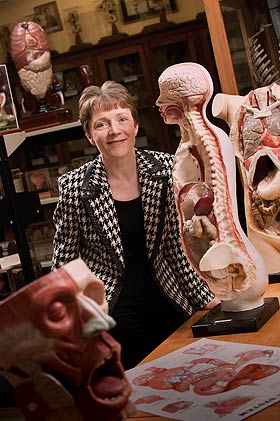

Associate Professor Anita Nolan
She is undertaking research to determine whether oral lesions are genetically consistent with Crohn's disease.
Imagine if the early signs of Crohn's disease were noticed up to 10 years before the illness began to ravage the bowel. Might it be possible to influence diagnosis, diet, lifestyle and treatment options, and help prevent some of the worst outcomes of the debilitating, often embarrassing, condition that currently affects some 15,000 New Zealanders?
These are the possibilities that motivate Associate Professor in Dentistry Anita Nolan as she works to piece together a riddle that has been percolating around oral health and gastroenterology disciplines for years.
Increasingly, clinicians and researchers have suspected a link between severely swollen lips – often observed in children and adolescents – and patients' likelihood of going on to develop a particularly aggressive variant of Crohn's disease. Certainly, there is a known group of Crohn's sufferers with severe mouth symptoms – known as oral Crohn's disease (OCD ) – which continue throughout their experience of the illness.
And, considering the digestive system is “one long tube, beginning at the mouth at one end and ending at the anus at the other”, the idea that symptoms of bowel and intestinal illnesses might present as problems of the mouth makes perfect sense to Nolan.
However, despite the “rumours and anecdotes” relating grossly swollen lips to “tummy problems and sore bottoms” among children and young adults, the association has never been confirmed.
Now, Nolan is undertaking research to determine whether these oral lesions are genetically consistent with Crohn's. Her study involves taking blood or saliva samples from Crohn's sufferers in Dunedin, comparing those with the oral symptoms to those without. If it turns out that those experiencing OCD have a distinct genetic signature, it may, in the future, be possible to test swollen-mouthed youngsters to establish whether they are likely to develop a more serious illness.
A firm diagnosis is crucial, believes Nolan. Despite the suggestions of a relationship between these conditions, we need to be very certain before bandying about suggestions of Crohn's disease, she says.
“Crohn's disease is a very serious diagnosis. In New Zealand, it is normally confirmed by an endoscopy, an invasive procedure – and perhaps OCD may help us to be more selective before suggesting this procedure. Those with the disease often make a lot of restrictions to their lifestyle and carry a lot of anxiety about the future – it's not the kind of diagnosis you want to worry people with unnecessarily.”
However, the implications of early detection could be significant. Crohn's disease is not well understood. A “modern disease” of the Western world, its prevalence is increasing worldwide, with genetic and lifestyle factors thought to cause an abnormality of the immune system, resulting in an attack on the gut. This can result in bleeding in the intestine (and anaemia), diarrhoea (leading to weight loss and nutrient deficiencies) and even faecal incontinence. The condition is incurable and treatment may include removing portions of the bowel as it deteriorates.
Further, the main symptom of Crohn's, chronic bowel pain, is the result of damage to the intestine. “So, by the time they are identifying problems, some damage has already occurred.”
However, oral lesions may precede the bowel symptoms by up to 10 years, says Nolan. “We know there are a number of triggers for the condition, including foods that make it worse and particular additives. Early diagnosis helps the patient and clinician to be proactive rather than reactive in the management of the condition.”
Even giving a name to the mouth symptoms may be enough to help some patients. Nolan originally trained and worked as a doctor and then a dentist, and it was as a clinician that she would encounter young patients with these symptoms – “they would be teased at school and were often miserable”.
Their emotional distress at their disfigurement was only compounded by Nolan's inability to suggest a solution. Indeed, Nolan points to research where sufferers experienced worse psychological effects than those who had suffered deformities due to cancers or accidents, “because they could not provide an explanation for their condition”.
Now, as well as looking at the genetic characteristics of oral Crohn's disease, Nolan's study also investigates its impact on patients' quality of life, including the social and psychological impacts.
“As a dentist, I gained a reputation for being interested in these symptoms. But being interested was not the same as being able to help. Ultimately I decided that I wanted to do the research that may give greater certainty and better options for these patients.
Witnessing their bravery and knowing the challenges Crohn's patients cope with, it seemed like the least I could do.”
Funding
- Otago Medical Research Foundation
- New Zealand Dental Association
- Ministry of Health Research Fund
- National Association of Crohn's and Colitis (UK)
